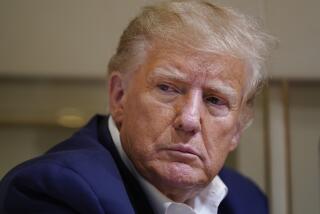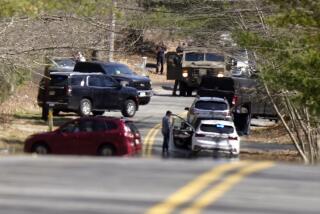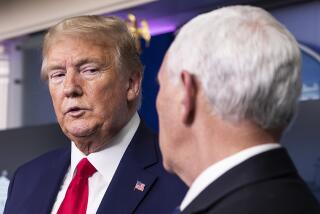Poindexter Feared ‘Ruckus’ if Diversion Plans Were Exposed
- Share via
WASHINGTON — Former National Security Adviser John M. Poindexter decided in February, 1986, not to tell President Reagan about the diversion of Iran arms-sale money to Nicaragua’s contra rebels because “it would cause a ruckus if it were exposed,” according to testimony released today.
The documents were distributed by the congressional Iran-contra committees along with hundreds of pages of transcripts from Poindexter’s private interviews with investigators in May, June and July before he testified in public for five days beginning July 15.
The private depositions were marked with the same sort of arguments between Poindexter’s attorney, Richard Beckler, and committee lawyers that occurred during the public hearings, with Beckler complaining repeatedly that he had not had access to documents the committees were using.
At one point, Beckler said on June 18 that he could not guarantee Poindexter would return for further questioning, causing Senate committee counsel Arthur Liman to raise the possibility of a contempt of Congress citation. Poindexter did return.
On the subject of the arms sales to Iran, Poindexter said in his private testimony that he wasn’t as bothered by the idea of trading weapons for hostages as some others. He didn’t say which others, but Reagan himself has said repeatedly it was never his intent to approve such a swap.
‘Imperfect World’
“I frankly don’t find that distasteful,” Poindexter said of the idea of selling arms to Iran in hopes of winning the release of U.S. hostages held in Lebanon. “I think that we live in a very imperfect world, a very dangerous world, and sometimes you don’t have the best options or the ideal option, and you’ve got to do what’s necessary.”
He said he made the decision to authorize the diversion of arms-sale money to the contras within the space of a few minutes after his aide, Lt. Col. Oliver L. North, had proposed it during a meeting of the two men in Poindexter’s White House office.
“I felt I had the authority to approve Col. North’s request,” Poindexter told investigators in May, in remarks that closely tracked the testimony he later offered in televised testimony in July.
“But because it was controversial, and I obviously knew that it would cause a ruckus if it were exposed, I decided to insulate the President from the decision and give him some deniability,” Poindexter said.
‘Decided Not to Tell’
“I decided at that point not to tell the President,” he said.
“I didn’t tell Col. North that I was not going to tell the President, so I don’t believe--you know, the President and I would be the only ones that can, that know the answer to that question, because I have met with the President privately.”
Poindexter added: “I recognize that it would be a lot easier on me now if I had told him, but honestly, the facts are I did not tell him.”
More to Read
Sign up for Essential California
The most important California stories and recommendations in your inbox every morning.
You may occasionally receive promotional content from the Los Angeles Times.













